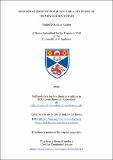Mechanochemistry for sustainable synthesis of framework materials
Abstract
The following work presents the successful application of mechanochemical methods in the synthesis of framework materials, namely zeolites and sodium carboxylate coordination polymers. Common benefits of employing mechanical forces to aid and cause chemical reactions are typically decreased reaction times, lower amounts or avoidance of solvents, and highly efficient reactions, leading to overall more sustainable processes.
A mechanochemically aided hydrolysis protocol for the second step of the ADOR (Assembly-Disassembly-Organisation-Reassembly) process was devised using zeolites with UTL framework as parent material. In contrast to conventional disassembly, which relies on the reaction occurring in solution at elevated temperatures, the use of a rotary ball mill allows for significant reduction of employed liquids (water or hydrochloric acid) and completion can be achieved on much shorter time scales. This reaction setup minimises waste production and requires lower energy input. Obtained intermediate zeolite phases can be reassembled into known daughter zeolites with *PCS, OKO, and PCR frameworks. The developed protocol and its low volumetric requirements for the hydrolytic reagent are not only beneficial from a purely synthetic point of view but could be applied successfully in the enrichment of product zeolite phases with the NMR active isotope 17O. Such enrichment procedures are typically time and energy consuming as well as carrying a high financial burden due to the low natural abundance of this isotope,
which necessitates enrichment procedures in the first place.
Several of the more complex zeolite frameworks are only obtainable as germanosilicate variant, suffering from the comparatively high cost of germanium reagents compared to silicon or aluminium analogues. In an attempt to extend the scope of the solvent-free route for zeolite synthesis, mechanochemical treatment of starting materials prior to the crystallisation reaction was performed, targeting four different frameworks. Reproducing literature reports, zeolites with ITH structure could be obtained. Further, materials with UOV structure were targeted, but instead yielding structurally related BEC zeolites. Synthesis of UTL was so far unsuccessful, but experiments additionally using seed crystals of the desired phase showed some preliminary success. Finally, pure silica and germanosilicate materials with ISV framework were synthesised for the first time using a solvent-free approach.
Sodium carboxylates, members of the class of framework materials called coordination polymers, are promising candidates for organic-based anodes of sodium ion batteries, but face difficulties in large scale production. A mechanochemical synthesis route for sodium carboxylates using several, chemically varied organic carboxylic acids and the environmentally benign sodium acetate as source for the alkali metal, has been developed to alleviate most of these concerns. Produced materials show electrochemical
performance on par with compounds obtained through conventional solution-based synthesis, with improved reaction conditions, avoidance of solvent and thus reduced waste.
Type
Thesis, PhD Doctor of Philosophy
Rights
Creative Commons Attribution 4.0 International
http://creativecommons.org/licenses/by/4.0/
Embargo Reason: Embargo period has ended, thesis made available in accordance with University regulations
Collections
Description of related resources
Mechanochemistry for sustainable synthesis of framework materials (thesis data) Rainer, D. N., University of St Andrews, 10 Mar 2024. DOI: https://doi.org/10.17630/0a756989-8d7a-4fde-8d77-fb57576f28d2Rainer, D. N., Rice, C. M., Warrender, S. J., Ashbrook, S. E., & Morris, R. E. (2020). Mechanomechanically assisted hydrolysis in the ADOR process. Chemical Science. DOI: https://doi.org/10.1039/D0SC02547J [http://hdl.handle.net/10023/20165]
Rainer, D. N., & Morris, R. E. (2021). New avenues for mechanochemistry in zeolite science. Dalton Transactions, 50(26), 8995-9009 . DOI: https://doi.org/10.1039/D1DT01440D [http://hdl.handle.net/10023/23429]
Rainer, D. N., Desai, A. V., Armstrong, A. R., & Morris, R. E. (2021). Mechanochemical synthesis of sodium carboxylates as anode materials in sodium ion batteries. Journal of Materials Chemistry A, 9(48), 27361-27369. DOI: https://doi.org/10.1039/D1TA07897F [http://hdl.handle.net/10023/24358]
Except where otherwise noted within the work, this item's licence for re-use is described as Creative Commons Attribution 4.0 International
Items in the St Andrews Research Repository are protected by copyright, with all rights reserved, unless otherwise indicated.


